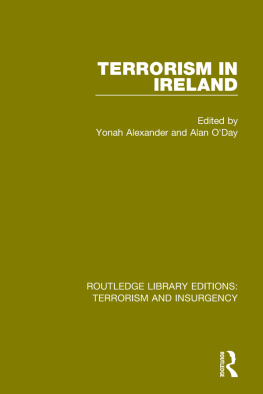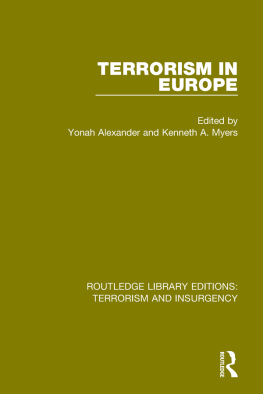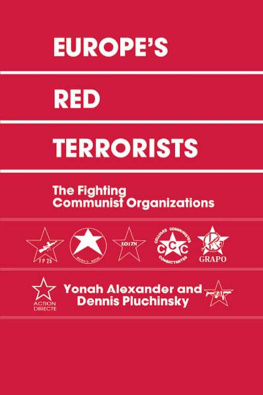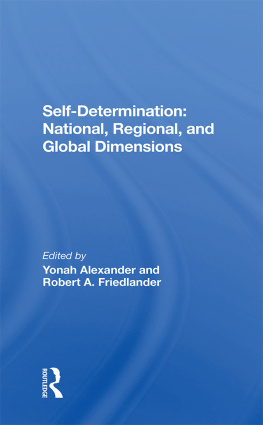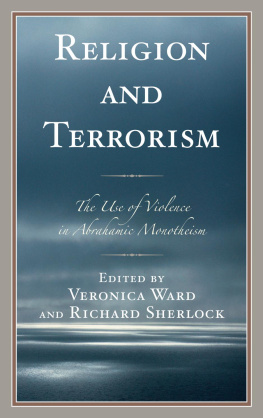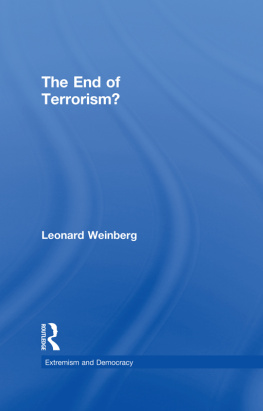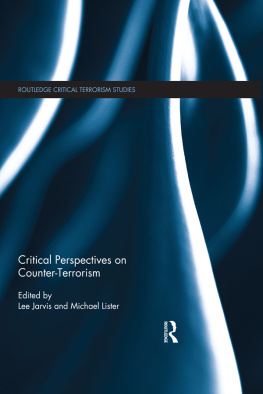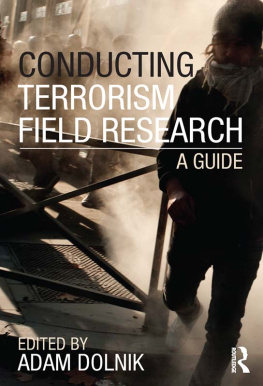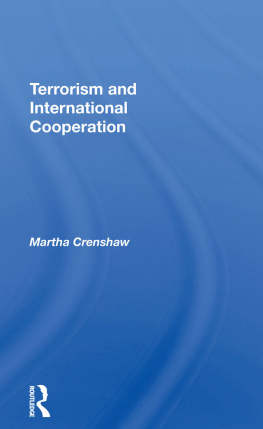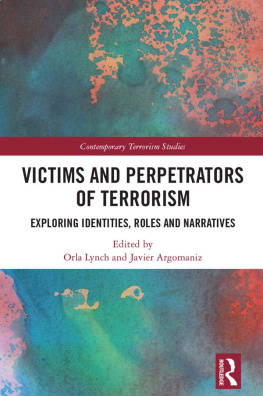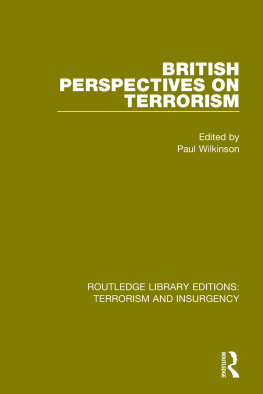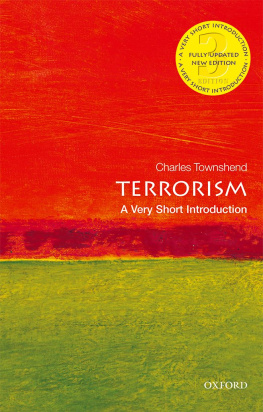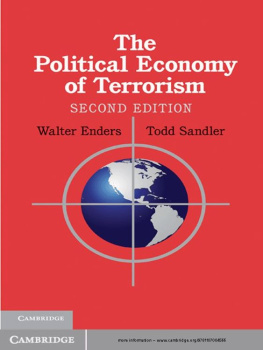ROUTLEDGE LIBRARY EDITIONS:
TERRORISM AND INSURGENCY
Volume 2
TERRORISM IN IRELAND
TERRORISM IN IRELAND
Edited by
YONAH ALEXANDER AND
ALAN ODAY
First published in 1984
This edition first published in 2015
by Routledge
2 Park Square, Milton Park, Abingdon, Oxon OX14 4RN
and by Routledge
711 Third Avenue, New York, NY 10017
Routledge is an imprint of the Taylor & Francis Group, an informa business
1984 Yonah Alexander and Alan ODay
All rights reserved. No part of this book may be reprinted or reproduced or utilised in any form or by any electronic, mechanical, or other means, now known or hereafter invented, including photocopying and recording, or in any information storage or retrieval system, without permission in writing from the publishers.
Trademark notice: Product or corporate names may be trademarks or registered trademarks, and are used only for identification and explanation without intent to infringe.
British Library Cataloguing in Publication Data
A catalogue record for this book is available from the British Library
ISBN: 978-1-138-83955-7 (Set)
eISBN: 978-1-315-69683-6 (Set)
ISBN: 978-1-138-90307-4 (Volume 2)
eISBN: 978-1-315-69713-0 (Volume 2)
Publishers Note
The publisher has gone to great lengths to ensure the quality of this reprint but points out that some imperfections in the original copies may be apparent.
Disclaimer
The publisher has made every effort to trace copyright holders and would welcome correspondence from those they have been unable to trace.
TERRORISM IN IRELAND
Edited by
YONAH ALEXANDER and ALAN ODAY
CROOM HELM
London & Canberra
ST. MARTINS PRESS
New York
1984 Yonah Alexander and Alan ODay
Croom Helm Ltd, Provident House, Burrell Row,
Beckenham, Kent BR3 1AT
Croom Helm Australia, PO Box 391,
Manuka, ACT 2603, Australia
British Library Cataloguing in Publication Data
Terrorism in Ireland.
I. Alexander, Yonah. II. ODay, Alan.
322.4209415 HV6433.173
ISBN 0-7099-05 22-X
All rights reserved. For information, write:
St. Martins Press, Inc., 175 Fifth Avenue, New York, NY 10010
First published in the United States of America in 1984
Library of Congress Cataloging in Publication Data
Main entry under title:
Terrorism in Ireland.
1. Terrorism Ireland Addresses, essays, lectures.
I. Alexander, Yonah. II. ODay, Alan.
HV6433.173T47 1984 303.62509415 83-3106
ISBN 0-312-79260-3
Printed and bound in Great Britain
CONTENTS
Yonah Alexander and Alan ODay
Michael McKinley
Raymond J. Raymond
Tom Gallagher
Suzann Buckley and Pamela Lonergan
Ken Heskin
Tom Corfe
Sheridan Gilley
D.G. Boyce
John Kirkaldy
Ken Ward
Philip Schlesinger.
Paul Bew
Martha Crenshaw
Yonah Alexander (co-editor) is Professor of International Studies and Director of the Institute for Studies in International Terrorism at the State University of New York at Oneonta and Research Associate at the Center for International and Strategic Studies at Georgetown University.
Paul Bew is Lecturer in Modern History at the Queens University of Belfast.
D.G. Boyce is Reader in Political Science and Government at University College, Swansea, in the University of Wales.
Suzann Buckley is Associate Professor of History and Womens Studies at the State University of New York at Plattsburgh.
Tom Corfe was formerly a Senior Lecturer at the Sunderland Polytechnic and is now a freelance writer.
Martha Crenshaw is Associate Professor in Political Science at Wesley an University (Connecticut).
Tom Gallagher is Lecturer in Peace Studies at the University of Bradford.
Sheridan Gilley is Lecturer in Ecclesiastical History, Department of Theology, at the University of Durham.
Ken Heskin is Lecturer in Psychology at Trinity College, Dublin.
John Kirkaldy teaches for the Open University and has previously been Lecturer in Contemporary European Studies at the Polytechnic of North London.
Pamela Lonergan studied at the State University of New York where she was, also, a research assistant.
Michael McKinley is Lecturer in Politics at the University of Western Australia.
Alan ODay (co-editor) is Senior Lecturer in History at the Polytechnic of North London.
Raymond J. Raymond is Assistant Professor in History at the University of Connecticut.
Philip Schlesinger is Senior Lecturer and Head of the Sociology Department at the Thames Polytechnic.
Ken Ward is Lecturer in History at the New University of Ulster.
Yonah Alexander and Alan ODay
Terrorism and other forms of political violence are topics of obvious importance though the ebb and flow of public interest rather depends on the presence or absence of spectacular incidents. Hence certain occasions, for instance, the Birmingham pub bombings in late 1974, explosions on Oxford Street in London, political murders, and injuries and deaths inflicted on soldiers and animals in London parks make vivid impressions on the public mind. However, the daily routine of killings and psychological terrorism in Northern Ireland now fails to attract much interest they have become the expected and no longer seem exceptional. However, it is the regularity of violence which makes it so vital an issue. For how long can the people of Northern Ireland endure violence? What effects will years of terrorism have on the afflicted population? To what extent can a liberal democratic society like Britain coexist with rampant terrorism activity within its legal boundaries? Just as Irish terrorism has not admitted to an easy solution, questions about the impact of violence on British and Irish society are not easily answered either. Yet there is urgency in both asking appropriate questions and attempting to supply answers or, at least, to dispel certain myths about terrorism and terrorists. The essays in this volume attempt to look at certain selected aspects of Irish terrorism and to advance the discussion of those topics. It is a modest attempt to provide building stones for what must be a large and complex structure.
The volume begins with three essays which assess some of the broader and international dimensions of Irish terrorism. Except for the Irish terrorists dependence on foreign arms and American cash, they are not deeply involved with similar movements elsewhere. Nevertheless, the wider facets of Irish terrorism and violence remain important. Indirectly, Lord Jellicoes report to the Government in February 1983 makes precisely this warning. He and others have seen that London may become the battle ground for warring political factions from the Middle East and elsewhere. Before 1978 international terrorism in Britain was insignificant when compared with violence generated by Irish problems but now police have to deal with as many of these acts as those of Irish provenance. London is not alone. Paris has experienced many terrorism incidents totally unrelated to French politics. Lord Jellicoe warns, My view is that we may be facing this threat for many years to come. He urges the extension of police powers of arrest and detention of suspected terrorists. His recommendations are at present only freshly before the Government and public and will be a matter of intense debate. What is significant about his report, though, is that a clear recognition has emerged that terrorism in Britain is a virus with many origins which will not be eradicated easily or quickly. The dangers are clear. International terrorists working in concert with their Irish counterparts or simply conforming to a similar time scale have the potential to create havoc.

